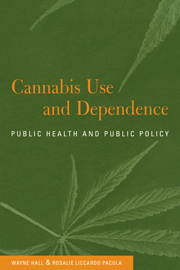Book contents
- Frontmatter
- Dedication
- Contents
- List of figures and tables
- Foreword
- Acknowledgements
- 1 Introduction
- Section 1 Cannabis the drug and how it is used
- Section 2 The health effects of cannabis
- Section 3 The psychological effects of chronic cannabis use
- Section 4 Effects on adolescent development
- Section 5 Harms and benefits of cannabis use
- Section 6 The effectiveness and costs of cannabis prohibition
- Section 7 Policy alternatives
- 17 Variations on prohibition
- 18 Cannabis as a legal substance
- 19 Summing up
- Appendix 1
- Appendix 2
- References
- Index
18 - Cannabis as a legal substance
from Section 7 - Policy alternatives
Published online by Cambridge University Press: 05 July 2016
- Frontmatter
- Dedication
- Contents
- List of figures and tables
- Foreword
- Acknowledgements
- 1 Introduction
- Section 1 Cannabis the drug and how it is used
- Section 2 The health effects of cannabis
- Section 3 The psychological effects of chronic cannabis use
- Section 4 Effects on adolescent development
- Section 5 Harms and benefits of cannabis use
- Section 6 The effectiveness and costs of cannabis prohibition
- Section 7 Policy alternatives
- 17 Variations on prohibition
- 18 Cannabis as a legal substance
- 19 Summing up
- Appendix 1
- Appendix 2
- References
- Index
Summary
In economics, a market is defined as the voluntary exchange of products and services between sellers (suppliers) and buyers (consumers). A market is legal when the government sanctions the exchange of the good or service. Operationally, a market is legal when the government allows a good or service to be brought to a marketplace, or as economists’ say ‘supplied’. The supply of a good like cannabis might involve cultivation, production, distribution (including transporting, importing and exporting the good), wholesale trade, retail sale, promotion and advertising. Not all aspects of supply need to be legally sanctioned for a legal market to exist. A completely free market would allow all these aspects of supply without restriction. There are no such free markets for cannabis anywhere in the world today, in part because of the 1961 United Nation's Single Convention on Narcotic Drugs, which requires all signatory nations to take necessary steps to limit ‘the production, manufacture, export, import, distribution of, trade in, use and possession of drugs’ (MacCoun and Reuter, 2001). There are, however, a number of countries that have experimented with some aspects of a legal cannabis market.
The Netherlands
The most well-known experiment with a partially legal cannabis market has been in the Netherlands. In 1976 a formal written policy of non-enforcement made the possession and sale of up to 30 grams of cannabis de facto legal even though the Netherlands technically retained its prohibitionist policy against cannabis (Korf, 2002). The policy basically stated that prosecutors and police would refrain from enforcing the law in those cases where the quantity possessed or sold did not exceed 30 grams. They would also tolerate the sale of these small amounts in coffee shops (MacCoun and Reuter, 2001). By not enforcing the prohibition in these cases, the Dutch government in effect sanctioned the creation of a small retail cannabis market. It continues to aggressively enforce the prohibition against the sale, distribution and trafficking of larger quantities of cannabis. The government also prohibits the cultivation of cannabis for personal or industrial use.
- Type
- Chapter
- Information
- Cannabis Use and DependencePublic Health and Public Policy, pp. 195 - 212Publisher: Cambridge University PressPrint publication year: 2002



